Žegunienė V. (2009). Future businesspeople intercultural competency and its relation with English language. Global Academic Society Journal: Social Science Insight, Vol. 2, No. 8, pp. 24-39. ISSN 2029-0365. [www.ScholarArticles.net]
Author:
Vaida Žegunienė, Klaipėda Business and Technology College, Lithuania
Abstract
We are moving forward continuously, so needs of society and people are getting higher and higher; students are interested in their knowledge, its systemizing and newness. Furthermore, new competences should be acquired if we want to work better and fulfil the requirements of labour market. According to Pundziene and Dienys (2002) “success of market development has direct links with continual renewal of technology and its effective usage. Creation, modernization and implementation of modern technologies are possible in the society with knowledge-based economy predominance.” The goal of this article and research is to find out how students perceive crosscultural competency and how it is related to English language in the modern business world.
Introduction
Information and knowledge are becoming the most important resources of the global society. Lithuania needs high quality and liberal education. It is relevant for population to improve its level of intelligence and to manage usage of modern information technologies, to know English language, to perceive cultures of other countries and peculiarities of the business world because of frequent participation in the international projects: students participate more actively in the Students Exchange Programs; colleges and universities improve their study programmes and develop new ones. In the modern scientific literature related to management field, different authors analyze topics such as usage of computer literacy in the educational process, development of management skills, improvement of qualification, improvement of schools, assessment of studies quality, and influence of the mentioned factors on modern education institutions, their mission and vision, and work of teachers and students. Academic and professional career and its success are closely related with person’s foreign language skills. “High quality education is becoming more important in the processes of Lithuanian society development, European integration, economic reforms and new science technology growth, new technology development and implementation; and of course, each mentioned factor influences changes in the labour market” (Sederevičiūtė, 2005). There are tendencies among employers to hire candidate with more competencies, improved English skills and more open to innovations. Today students are motivated to choose studying foreign language by influence of modern economical and political situation in Lithuania; we prefer to choose that language which is popular in the business and science world. One of those languages may be English language. The purpose of learning English language as well as other foreign ones is to develop speaking skills which would be useful for communicating, studying or working in Lithuania or outside. Foreign language studies may not be identical with traditional, philological, ethno-cultural context of that country. It is required to change attitude toward foreign language studies, their organization, orienting the lastmentioned to the specific features of the international language studying process. According to Grigaitienė (2005), “…speaking skills and ability to reflect and communicate own culture to others have to be developed. It is possible to define intercultural communication in the same way as well; furthermore, it couldn’t be dissociated from studies of the international language.” Besides that, we may follow Piliponis (2005) opinion, that “… languages cannot be closed in. Cultural links are being expanded by mass communication tools. Common languages, being a communication tool, are necessary for individual, science-technical, economical, cultural or political exchange”. Due to the modern-day situation the problem of research is formulated as follows: do students as future businesspeople perceive which new requirements they should fulfil in the nearest future, whether the English language skills or intercultural competency? Young people should be open to innovations and adapt to the new labour market requirements very quickly. High schools are in step with innovations and they are unconcerned with modern technologies. New knowledge is necessary for development of new competencies, that’s why it is need to be transferred intensively and qualitatively as much as possible. For that purpose the research has been carried out, during which business management and logistics management students were asked about relevant things such as intercultural competency, its development and relation to English language.The article consists of three sections: the first section includes relevant for future businesspeople information about intercultural competence and its influence on the society and labour market, which are affected by globalization; the second section represents methodical part of the research about future businesspeople’s perception of the term “intercultural competency” and its relation with English language; the analysis of research results is presented in the third section.
Importance of English Language in Global Context
Variety of European languages and verbosity in the business world are unavoidable for both teachers and students and till now it is a serious problem. Despite that fact foreign language creates a greater possibility to develop own personality morally and communicate more joyfully. Students’ philological sophistication plays an important role in general student’s sophistication not just in professional context, and in common perception of personality as well. Student’s thinking, skills of conclusion-making and critical evaluation of situation, and penetration into cultural and spiritual spheres depend on his/her sophistication. English language is a foreign language, which has been studied at the secondary school and further at the high school. This language is known in the whole world and is more like an international language. Evidence of that fact is number of the English language speaking people and moreover, its usage level in the intellectual, economical and cultural spheres all over the world. Some facts are presented in Table 1.
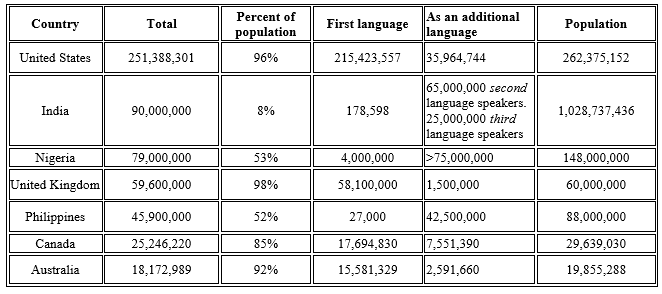 Table 1. Countries in order of total speakers (Smith, 2007)
Table 1. Countries in order of total speakers (Smith, 2007)
Because English is so widely spoken, it has often been referred to as a “world language”. While English is not an official language in most countries, it is currently the language most often taught as a second language around the world. Smith (2007) believes that it is no longer the exclusive cultural property of “native English speakers”, but is rather a language that is absorbing aspects of cultures worldwide as it continues to grow. It is, by international treaty, the official language for aerial and maritime communications. English is an official language of the United Nations and many other international organizations, including the International Olympic Committee. According to the surveys carried out by the European Commission (2006) English is the language most often studied as a foreign language in the European Union (by 89% of schoolchildren), followed by French (32%), German (18%), and Spanish (8%). Among non-English speaking EU countries, a large percentage of the population claimed to be able to converse in English in the Netherlands (87%), Sweden (85%), Denmark (83%), Luxembourg (66%), Finland (60%), Slovenia (56%), Austria (53%), Belgium (52%), and Germany (51%). Norway and Iceland also have a large majority of competent English-speakers.
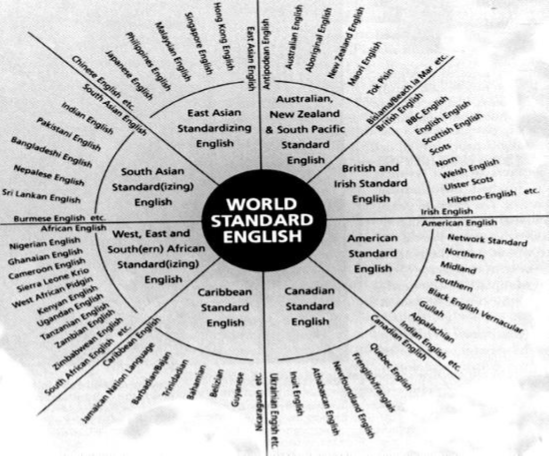 Figure 1. English language growth (Crystal, 1995)
Figure 1. English language growth (Crystal, 1995)
Books, magazines, and newspapers written in English are available in many countries around the world. English is also the most commonly used language in the sciences. In 1997, the Science Citation Index reported that 95% of its articles were written in English, even though only half of them came from authors in English-speaking countries. British colonialism in the 19th century and American capitalism and technological progress in the 20th century were undoubtedly the main causes for the spread of English throughout the world (see Figure 1). The United States have played a leading role in most domains for the last hundred years. At the end of the 19th century and first quarter of the 20th, it welcomed millions of European immigrants who had fled their countries ravaged by war, poverty or famine. English started being used in diplomacy and gradually in economic relations and the media. The United States have consolidated their cultural, economical and technological power: inventions, rock and roll, the first man on the moon, the revolution of the Internet, the country’s growing prosperity and commercial aggressiveness have contributed to the further expansion and importance of English in the world today. McKey (2002) noted that English language is language of the international organizations, popular culture, international tourism, publications, information technology and education. German and French languages may be considered as international languages as well but just in the context of the European Union due to the number of speaking people, economical potential and political influence. It is possible to note, that English is an international language. It is spoken all over the world. Owing to this language we communicate with many people globally. English is also the language of technology. Many kinds of technology are based on this. The role of English language is increasing year by year. A lot of people have learnt and are learning it to be more educated. In several years it will become the world language.
Intercultural Competence
Future trends of the modern business are quite clear – the market is expanding globally, people migrate across the world, almost in every organization it is possible to meet workers from different cultures. Successful activity depends on both managers and employees and their competencies and skills. So existence of globalization is obvious; it covers academic, business and daily life; thus everybody participates in the process of globalization and creates factors, which influence different daily activities more intensively. Bridges (2004) states that, importance of intercultural communication and ability to act effectively in the intercultural environment as well as in the intercultural professional and academic societies is increasing. If effective communication is one of the presumptions for successful cooperation and activity, then ability to communicate effectively in the intercultural context becomes integral part of modern specialist’s work. Nowadays that problem is relevant for Lithuania, which is efficiently participating in the international projects that analyze situation in the context of high education and business. Consequently, development of communication and intercultural competency is important objective for the high schools. According to Maţeikis (2008), intercultural competence is communication between representatives of different cultures. This is an interchange of information among people from other cultures. Knowledge of the different nations’ attitudes towards education, duties, etiquette and behaviour is very important. Dynamic moments of intercultural competency are presented in Table 2.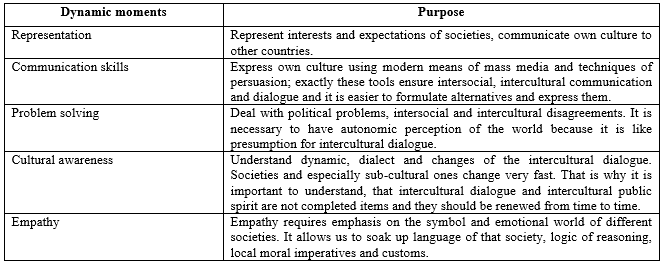
Table 2. Dynamic moments of intercultural competency (Mažeikis, 2008)
All mentioned moments and knowledge are related with ability to develop dialogue among cultures. Dialogue is linked to free self-expression of ME and YOU. At last, free and equal dialogue makes it possible to minimize violence, segregation and oppression and invisible barriers among nations.
Relation of English Language, Intercultural Competence and Business
Analysis of the aspects in the scientific literature, e.g. attitudes of different scientists towards intercultural competence, we can see the importance of intercultural competence for the academic and business world. It is stated, that intercultural competence is relevant for future businesspeople and that development of competence should be started at the secondary school and this process should be continued further studying at the higher education institution. Importance of intercultural cooperation and ability to operate effectively in the intercultural environment is growing in the context of global integration. “Effective communication is one of the presumptions for successful cooperation and activity, so ability to communicate effectively in the intercultural context is integral part of the modern specialist” (Cesevičiūtė, 2004). That problem is relevant for Lithuania, which currently integrates into European and global business societies. General communication competence and communication competence in the aspect of foreign language are one of the most essential competences of the modern specialist (Buinevičiūtė and Lepaitė, 2003). It is necessary to consider all abilities and situations because they may lead to dramatic results, especially in the business world, what is relevant for future businesspeople. The background of intercultural competence is acquired in the secondary school. Each student, especially future businessperson, has to perceive growing importance of intercultural competency in the future business activity and moreover, its influence on the results of the future business. Business is being expanded across the world and the most important thing in this expansion process is communication channels, which are used by people, institutions and organizations for information transfer. People shouldn’t forget that all information is transferred using modern information technology and preferable foreign language. As it was mentioned above, English language is referred to the international language, so each organization which is confronted with needs of intercultural competence, tries to deal with factors influencing that competence. Future businesspeople should perceive that due to growing globalization many organizations become more flexible, operate in global context, differ in decision-making and information is overspread across the world. Society becomes more productive and efficient; there are possibilities to use new technology in production and management. Regarding to that process, teachers of different educational institutions have to develop intercultural competence to provide students with qualitative and relevant professional knowledge. Considering this fact, higher education institutions have to become life-long learning and innovation-intensive organizations. According to Straub (2008), openness is the feature of globalization in the 21st century. Openness is important in the modern business world and it’s advisable to understand importance and benefit of that feature. Openness is related with values such as tolerance, personal freedom, life-long learning, participation in different activities, empowerment and cooperation, which are opposite to values of close world. Open world is the world of huge opportunities and challenges, which require changes in our individual behaviour and approaches. Talking globally is quite complicated, but we can pay our attention to the neighbour European states. Šucha (2008) noted that, there are some complicated questions which cover intercultural communication and intercultural competence as well. Do the states of the European Union have the common perception of Europe and sense of common aim and unity? Which cultures conflict in modern Europe – ethnic groups or different subcultures, which are unified by common values and beliefs? What does ordinary citizen think about other countries and is it expedient to avoid communication with them and their representatives?
Research Methodology
The article presents a research, which studies the concept of “intercultural competency” and its relation with English language and future businesspeople activity. The aim of the research is to analyze influence of English language on development and improvement of intercultural competency. The tasks of the research are as follows:
- to survey students’ perception of the term “intercultural competency”;
- to find out whether intercultural competency influences the future business activity or not;
- to establish whether intercultural competency is influenced by English language or not.
The research employs quantitative research method. Data was collected using questionnaires in written form, and later analysed using methods of descriptive statistics. The main method of the research was questionnaires for students because it allows to gather information about students’ attitudes, approaches and knowledge in easier and more efficient way (Merkys, 1995). Advantages of the questionnaires, which influenced decision to apply this method of information collection, are as follows (Kardelis, 2002):
- That form is applicable to the educational research, it is cheaper and process gets faster;
- That form is more informative and it may be applied to the scientific research;
- If the questionnaire is planned well, it is possible to expect more answers;
- Because of ensured confidence, it is possible to get more true answers.
The questionnaire consists of two sections. The first part includes questions about general information of respondent;and there are 8 questions for respondent in the second part. One of these questions is open-ended and designed for revealing students’ approach towards intercultural competence and etc; other types of questions – matrix and multiple-choice, which require students to choose one possible answer from the list and add their own facts. In that way more detail information was available. Sample of the research. Sample of the research consists of first year students from Klaipėda Business and Technology College, Business Faculty. They are studying according to the Logistics Management and Business Management study programmes. Respondents completed 60 questionnaires. Distribution of students according to study programmes is presented in Table 3.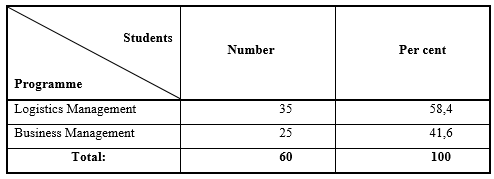
Table 3. Distribution of respondents by study programmes
Specific sample of the research was carried out. First year students were chosen, because their intercultural competence is relevant issue for them. At this moment Lithuania suffers from changes in such areas as labour market and business. So students, studying according to these study programmes, should plan their future, which will be related with business, very precisely.
Results of Research
The purpose of the first question was to find out students’ perception of intercultural competence, whether that concept is interpreted in the right way or not. The definitions of this concept were different. Analyzing the answers we can say, that intercultural competency is referred to communication between representatives of different cultures (28%) and knowledge of other countries and cultures (52%). Other possible ideas were as follows: the opportunities of business expansion (2%) or having no idea what it means (18%). Definitions of that concept are quite abstract and superficial. This fact shows that students are not able to define the intercultural competency and they don’t perceive what kind of competency it is. Actually this competency is related just with knowledge of other cultures (see Figure 2). 
Figure 2. Perception of the intercultural competence
The first question was designed to reveal general perception of the international competency and the following question seeks to find out more detail information about the elements of intercultural competency. The respondents were given a list of elements and they were asked to distribute them on scale “important-not important” according to their perception of importance (see Figure 3). The majority (50%) has chosen the English language as one of the most important element of the intercultural competency. As it is expressed in the figure below, other elements also play an important role and they are not ignored. As we can see personal qualities are of the second importance – about 45% of respondents, then cross-cultural skills – exactly 42%, information on other countries – almost 41%, knowledge – approximately 30% and team-work – almost 26%.
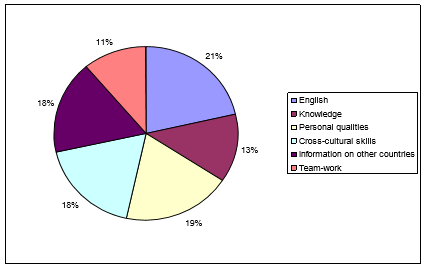 Figure 3. The elements of intercultural competence
Figure 3. The elements of intercultural competence
The respondents were asked about importance of the intercultural competency development (see Figure 4). Almost all respondents’ answers were positive (92%). This means that they have positive approach toward that competency. Students gave arguments that the process of globalization stimulates communication with representatives of foreign countries; for that purpose particular knowledge is necessary to acquire, for example, facts on culture, customs, traditions, career opportunities and the future business expanding.
Figure 4. Necessity of intercultural competence development
The system of high education should be focused on the changes in the labour market requirements as well as processes in the society and business. The respondents are asked about methods of the competency development and note specific information, during which subjects students can get information about foreign countries, their features, people and etc. Students noted several subjects where teachers provide knowledge about other countries, i.e. peculiarities of communication, culture, business organizing, living style, behaviour and etc. We can see that the most important subjects for development of intercultural competency are as follows: the lectures of English and Russian Languages, History of Culture, Marketing, Business Etiquette, Philosophy, Management Principles, Sociology and Language Culture. During these lectures teachers present and analyze examples from foreign countries, situations with people or businesspeople, foreign living style and rules of business organizing. Respondents were asked to give more detail information which lectures of foreign languages provide more knowledge of other countries. Approximately 17% of respondents noted, that lectures of English language are at the first importance and lectures of Russian language are at the second one. According to that information, it is possible to state that English language influences development of intercultural competency. Furthermore, respondents could choose spheres in which English language is most required (see Figure 5). Actually English language is related with communication (49%) and respondents used quite relative concept “business language” (22%). These two categories, such as “communication” and “business language” were separated and that fact can be seen in Figure 6. Many respondents noted that, English language may be used for finding information, which is necessary for studies (12 %) and it allows to work more efficiently (7%). As we understand, English language is very important for developing of intercultural competency and it influences the study spheres relevant for future businesspeople such as communication firstly and communication using special “business” language.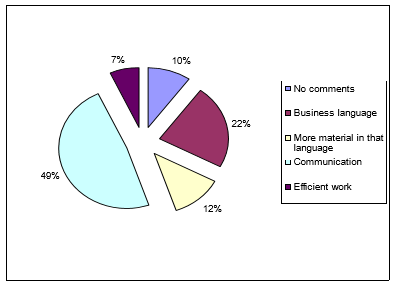
Figure 5. The influence of English language on the development of intercultural competency
Nowadays many scientists analyze quite relevant topic such as intercultural competency and its relation with the business world. The respondents’ point of view is expressed in answering open-ended question about the importance of intercultural competency for future businesspeople. The answers were different and interesting. It was possible to group statements which were dominant in the answers (see Figure 6). Majority of the respondents stated that English language is the most important for communication with partners from other countries, because it is considered as a dominant language in the whole world and all business world representatives should communicate in one common language – English language.
Figure 6. Relation of English language and intercultural competency of future businesspeople
Importance of the intercultural competency is increasing. If future businesspeople want to meet requirements of the labour market and future employer, it is relevant for them to perceive importance of this competency. According to the respondents’ opinion this competency may influence success of future business activity. Concept of “business success” means expansion of business, social contacts, successful relationships with partners (see Figure 7). 
Figure 7. Relation of intercultural competency with the success of future business activity
After this research is it important to pay teachers’ attention to students’ activities and show importance of intercultural competency. As we can see, students are interested in own future and relate it with business field. Furthermore, business and its success partially depend on intercultural competence and due to the globalization process relationships with representatives from other countries are very important and influence our lives and activities.
Discussion
According to Bridges (2004), during the last decade attention was paid to high education and its contribution to the development of regional and national economics in different countries. The exclusive role of high education is related with the growing importance of knowledge-based economics, although the presumption may be done that competitiveness of the different business fields depends on ability to implement innovations and adapt to new world of information and communication technology. It is stated that specialists with high qualification are more desirable in business. Young people should perceive that knowledge is the most valuable phenomenon in our society, but as it can be seen from the components of intercultural competency, personal qualities such as tolerance, personal freedom and cooperation may not be ignored as well. These qualities help to maintain positive relations with other countries. It is worth to mention, that modern technology allows us communicate with the whole world at any time we wish. Modern communication tools stimulate communication and especially international one, which should be based on more close and positive relations and interaction. Each business environment has its own elements; the same might be said about companies. If businesspeople want to enter new business spheres and foreign business markets, they should develop their competences and especially intercultural competency.
Conclusions
- Consistent change influences students’ activities as well as stimulates changes in the academic world. For that reason, it is not recommended for students to dissociate from environment, but rather to play an active role in outward environment as well as in processes and activities. College students being future businesspeople should perceive these processes, while education institutions should contribute to the formation of right perception of the whole environment. In colleges and other education institutions students should begin their integration into society, find out information about society’s requirements and, furthermore, meet those requirements. One of the most important factors is competences. The intercultural competency contributes to our life and it may not be ignored either by students nor by teachers or by representatives of business world. Consequently, right perception of intercultural competency is very important, but it is pity that this concept is interpreted in improper way. Given definition of competency is quite superficial, besides that, students know that it refers to communication between nations and representatives of different cultures, which is impossible without particular knowledge of particular culture and country, its customs, traditions, people behaviour and living style and etc. Development of intercultural competency may not be completed without foreign language skills, especially English language, particular knowledge, which is provided by teachers using appropriate studying methods such as the Internet, visuals, DVD.
- It can be noted that, English language influences the development of intercultural competency and relation between these objects is obvious – the better English skills are the better intercultural competency is developed. During developing intercultural competency, the best results may be achieved through improving English language skills. It is true to say that, knowing of one foreign language is not enough, and other languages may not be ignored. Students must have sense of curiosity and pay attention to studies at college as well as to self-education, because through studying different subjects it is possible to find out useful information and interesting facts about other cultures, business peculiarities, which are important for future businesspeople activity. Especially importance of last-mentioned fact grows studying at business study programmes.
- Intercultural competency is relevant for business world representatives, future businesspeople and all knowledgeable people. This fact finds support not only among theorists of the scientific literature, but also among the businesspeople as practicians. Intercultural competency influences business success, searches for right partners and successful relationships with business partners. In the academic world students have many opportunities to participate in different projects, programmes not only in Lithuania, but in foreign countries as well. Starting own business career, the perception of foreign country features plays an important role. Considering this fact, the career development should be starting at the secondary school when student is able to realize his own future and develop necessary competences due to future employer’s requirements.
References
- Bridges, D. (2004). Aukštasis mokslas ir ekonominė plėtra. Available at: http://www.education.ktu.lt /zurnalas/lt/2004
- Buinevičiūtė, A., Lepaitė, D. (2003). Europos šalių mokyklų komandų bendradarbiavimo europiniuose švietimo projektuose ypatumai ir jų prieţastys. Socialiniai mokslai. Kauno technologijos universitetas. No. 2 (39). p. 56.
- Cesevičiūtė, I. (2004). Tikslinės edukacinės aplinkos komunikacinės kompetencijos ugdymui universitete ypatumai: konteksto ir patirties dimensijų raiška. Available at: http://www.education.ktu.lt/zurnalas/lt/2004
- Crystal, B. (1995). The growth and expansion of English. Available at: http://www.talkingpeople.net/tp/languages/worldeng
- European Commission (2006). Europeans and Languages. Available at: www.ec.europa.eu/public_ opinion/archives/ebs/ebs_
- Grigaitienė, R. (2005). Būsimų anglų kalbos pedagogų poţiūris į tarptautinės anglų kalbos mokymą ir interkultūrinės komunikacijos ugdymą. Pedagogika. Mokslo darbas. No. 80. Vilnius. p. 18.
- Kardelis, K. (2002). Mokslinių tyrimų metodologija ir metodai. Kaunas: Judex. p. 58.
- Maţeikis, G. (2008). Tarpkultūriškumas, globalizacija ir integracija. Available at: http://info.smf.ktu.lt/Edukin/zurnalas/lt/2008-2_(60)/summary.html
- McKey, S. L. (2002). Teaching English as an International Language. Oxford. p. 63.
- Merkys, G. (1995). Pedagoginio tyrimo metodologijos pradmenys. Šiauliai. p. 92.
- Piliponis, A. (2005). Socialiniai kalbiniai šiuolaikinės komunikacijos vadybos aspektai. Pašto veiklos specialybės studentų paţiūrių lyginamoji analizė. Pedagogika. Mokslo darbas, No. 76. Vilnius. p. 76.
- Pundzienė, A., Dienys, V. (2002). Darbas ir mokymasis: darbo pasaulio ir švietimo sąveikos pobūdţio kaita. Available at: www.vdu.lt/alearning2003/I%20Dalis/LT/pundziene_lt_geras.doc
- Sederevičiūtė, Ţ. (2005). Technologijos ar namų ūkis? Dalyko raidos Europoje lyginamoji analizė. Pedagogika. Mokslo darbai. Nr. 76. Kaunas. p. 36.
- Smith, R. (2007). Global English: gift or curse? Available at: http://journals.cambridge.org/action/displayAbstract; jsessionid= 92238D460772 6060BCBD3 DB 70 C 472D0F.tomcat1?fromPage=online&aid=291932
- Straub, R. (2008). Ar pasaulis yra atviras? Available at: http://www.elearningpapers.eu/index.php?page=doc&doc_id=11653&doclng=11
- Šucha, V. (2008). Ar kultūrą galima išversti? Available at: http://www.balsas.lt/naujiena/194299/arkultura-galima-isversti/rubrika:naujienos-kultura
